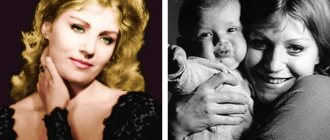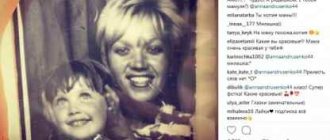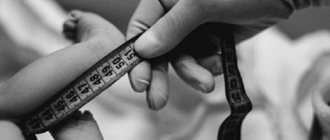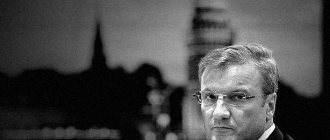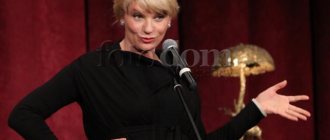Origin
Anna German's roots go far back to Holland, from where her ancestors moved to Germany, and then to Ukraine, near the Sea of Azov. There, the great-great-grandfather of the legendary singer founded the village, which was then called Neuhoffung, which translated into Russian means “Hope”. This settlement still exists, although under a different name - Olkhino.
Anna's grandfather Herman Friedrich had nine children, among them was the father of the future star - Eugen (Eugene in the Russian manner) Herman. But during the dispossession of kulaks, Friedrich Herman was arrested for 10 years without the right to correspondence and died at hard labor near Arkhangelsk. The same fate awaited all of Frederick’s children, and one of his sons, Willy, ventured to escape through Poland to Germany.
After his wanderings, Eugen first ended up in Donbass, and from there he fled to Uzbekistan. In this country, or rather in the city of Urnech, Eugen met his second wife (Anna German's mother) Irma Martens. The woman was from a family of Dutch Protestants who arrived in Russia at the end of the 18th century. The young people had a lot in common: language, love of music and poetry, which brought them together. And on February 14, 1936, they had a daughter, who received the name Herman Anna-Victoria.
The story of singer Anna German: The celebrity’s family was saved from death by a Polish intelligence officer
Anna German's heart stopped beating on August 25, 1982 in Warsaw. The artist died at the age of 46 from sarcoma. Now the singer’s biographer Ivan Ilyichev is preparing for publication a new book, “Central Asia - the Homeland of Anna German,” where he will tell about the tragic childhood of the future star.
The case is classified as "secret"
— Ivan, they are still arguing about Anna German’s nationality. So who was she - Polish, German, Russian?
— On her mother’s side and partly on her father’s side, Anna belonged to the descendants of the Dutch Mennonites (followers of a religious movement, the founder of which was the Catholic monk Menno Siemens). These are immigrants who lived in Poland for many years, and in the 19th century ended up in Russia and Ukraine. So Herman is a hereditary Dutchwoman with some German blood. According to the documents, her parents were listed as Germans.
The singer lived only 46 years, 36 of them in Poland, which she loved and called her homeland. But Anna’s childhood passed in the USSR during the most terrible years in our history. The ten years she spent in the Union were filled with grief, suffering, and wanderings.
Here her father was shot, her uncles and aunts died in camps and exile - more than ten close relatives. Anna was deprived of the opportunity to visit their graves; nothing was known about them. I miraculously managed to find the burial places of her uncle in a cemetery near Kaliningrad and her brother Friedrich in Tashkent at the Botkin cemetery. Alas, such a terrible fate befell many Germans living on the territory of the USSR in those years.
— Did you manage to find out the details of the execution of her father?
“We contacted the archives of the Tashkent prosecutor’s office, and they responded that the case of the arrest and execution of Anna’s father, Evgeniy German, is still kept top secret.” Even relatives are not given access to the materials of this case.
It was 1937. Anna was only one year old. Her father and her uncle were arrested based on a false denunciation. Anna's father was brought to Tashkent and tortured for several months in the dungeons of the local NKVD. Anna German's mother wrote in her diaries:
1936 Uzbekistan, Urgench city. From left to right: the parents of the future artist Irma and Evgeniy, little Anna and her grandmother Anna Martens. This is the only photo where the girl is next to her natural father. Photo: Personal archive of Ivan Ilyichev
“Both were arrested. My God! Black clouds are hanging over us! I went to the prosecutor, breathing heavily, about to give birth. She asked where my husband Evgeniy German and brother Wilmar Martens were. In response I heard:
- Your husband has been exiled for ten years without the right to correspondence!
- For what? For what?
They didn't answer me...
- Can I go to him?
- No…"
“Shine, my star” - a song about my father
The mother looked for Anna's father in the camps; no one gave the exact address. She was always led on the wrong trail, without being informed that Evgeniy had already been shot. The family learned about his death much later. In search of her father, the family wandered around Central Asia, little Anya got used to moving and as a child spoke fluent Russian, Uzbek and Kyrgyz languages...
One of the surviving prisoners met Anna's mother on the street and told about the last days of Evgeniy German. He was led down the corridor, bloodied, exhausted, his face looking like a bloody mess. They tortured him into confessing and eventually shot him.
— Did Anna German have a grudge against the Soviet regime?
“In those years, no one could ask Anna such a question publicly. She came to the USSR many times and secretly dedicated one of her songs in concerts to the memory of her father. We are talking about the romance “Shine, Shine, My Star.” In the arrangement, Anna first came up with the sound of a drum roll - the same one that thundered on the scaffolds. None of the spectators had any idea that Anna’s “welcoming love star” was her father.
Documents from the Kyrgyz school where Anna studied. In the USSR, the girl bore her grandmother's surname - Martens. Photo: Ivan ILYCHEV
“I decided to steal”
— Anna was raised by her grandmother and mother Irma. Terrible, hungry time! In the diary of mother Anna German I found the following entries:
“The only food I received was a piece of rye bread. There was no work, there was no food, we lived in a dugout, huddled between six of us with strangers. Then we moved to Orlovka in Kyrgyzstan. There, for working on the collective farm, I received bran, and my mother baked cakes from it. We didn't have firewood to heat the house, it was very cold. I decided to steal! First time in life. I stole collective farm straw. It was very risky, I would have been shot.”
There was almost no clothing; in winter, the mother wrapped her daughter’s legs in rags, inside which wooden plates were inserted. Seven-year-old Anya went to school in these “shoes.” And she got sick very often.
Anna's younger brother Friedrich died before he was two years old. The singer’s mother Irma recalled:
“In Tashkent, children fell ill with scarlet fever and were taken to the hospital. I received a telegram from my mother: “Come urgently, the children are sick.” I had to leave immediately without getting permission from the school. When I entered the house, I only saw Anechka. Mom shouted in tears: “My son is dead!”
Screaming and crying! From grief I could not utter a word, I silently sank into a chair. Anya, pale from illness, quietly sat down on my lap. I hugged her to me..."
A Polish Jew helped
“The Polish officer Herman Gerner played a colossal role in the fate of this family,” continues Ivan Ilyichev. — This is a man of Jewish origin who fled Poland in 1939 from the genocide perpetrated by the Nazis. His entire family was slaughtered... Exhausted by hunger, covered in lice and dying, he was found in Kyrgyzstan and given a job at the school where Irma worked. An amazing fact: a Polish Jew, who fled from Nazi persecution, decides to enter into a fictitious marriage with Anna’s mother, who according to the documents was listed as German!
- Why was this marriage needed?
“On the eve of the war, Anna’s mother Irma was already on the list of people who were being prepared to be arrested. After all, the wife of an enemy of the people. It turns out that Gerner saved Irma and her family from repression and certain death. Thanks to the fictitious marriage, Anna’s mother was recorded as Polish in the documents, and she was able to leave the Soviet Union. And then, in the USSR, Anna German would hardly have achieved fame if she had been considered German. The Germans living in the USSR in those years were almost completely powerless. And so she was accepted onto our stage as a singer from socialist Poland.
By the way, Anna herself bore her grandmother’s surname - Martens. And only after moving to Poland in 1946, the mother registered the girl as Anna German.
Herman Gerner worked for Polish intelligence and often changed his names. Photo: Personal archive of Ivan Ilyichev
Spy detective
— The story of Herman Gerner himself is like a complicated detective story. Anna German's family “buried” Gerner as soon as they arrived in Poland. In all interviews, both Anna and her mother claimed that their stepfather died on the battlefields. This was reflected in all her numerous biographies.
I was tormented for a long time by the thought of the fate of the man thanks to whom Anna German ended up in Poland. And recently it turned out that the singer’s stepfather changed his first and last names several times after the war. He collaborated with Polish intelligence and led a very closed lifestyle. For a long time he lived in Warsaw almost side by side with Anna German and died in 1985, three years later than his famous stepdaughter. The information was revealed only thanks to Polish military and intelligence archives.
Personally, I learned the truth about Hermann Gerner thanks to the fact that he also had his own biographer. Pole Wojciech Karpinski, living in France, wrote a book about the fate of his friend, not suspecting that he was writing about Anna Herman’s stepfather. He wrote about the Polish intelligence officer and journalist Henryk Krzeczkowski! And only thanks to my previous book was he able to compare the facts and understand that his friend, changing his first and last names, was Hermann Gerner in the 40s...
Thus, two men - Evgeny German and German Gerner - gave us Anna German. Her father gave her life and surname. And the stepfather is his homeland and salvation.
5 main songs of the artist
"Hope"
"When the Gardens Bloomed"
"Echo of love"
"Accident"
"Burn, burn, my star"
Childhood
Anna's mother was a German teacher by profession, her father was an accountant, but he composed songs and performed them beautifully himself. A young family lived with Irma’s mother, who helped them raise the child. The couple's happiness was short-lived, because eight months after the birth of their daughter, Evgeniy German, was accused of espionage and sentenced to ten years in prison. But already in 1938 they were shot in the capital. In the same year, she had to endure another loss - the death of Anna's younger brother Friedrich (Igor in the Russian manner) from illness.
Frightened and desperate women decided to flee Uzbekistan. So they changed their place of residence throughout the Soviet Union. First they ended up in the capital of the Uzbek SSR, then fate brought the women to the north of the USSR to Novosibirsk, and from there to Krasnoyarsk. And then I had to move to Kazakhstan and stay in the city of Dzhambul. Here Anna went to first grade and studied for three years.
In this city in 1942, Anna’s mother married a Polish officer for the second time, whose name, by a mystical coincidence, was Herman. But less than a year after their wedding, he died in a battle near Lenino in Belarus. Not believing in the death of her husband, Irma left for Herman’s homeland in the hope of waiting for him there. This is how Anna’s family ends up in Poland. And in 1949, their small female family moved to live from Nowa Rude to Wroclaw, where Anna’s mother got a job in her profession at the local academy.
Childhood and youth
Although Anna German herself called herself a Polish singer, she was not an ethnic Pole. In her biography, Russia, which in the 20th century was called the USSR, played a large role.
Data! Anna has German-Dutch roots. The ancestors of her father and mother were Dutch Protestants who came to Tsarist Russia back in the 18th century.
When her grandfather was dispossessed, her father Eugen, like his 8 brothers, was forced to go into hiding. He moves from the Ukrainian village, which was founded by his great-grandfather, first to the Donbass, and then to the Uzbek Urgench, where he met Anna’s mother, Irma Martens. Eugen Hermann was an accountant, and Irma was a German teacher. Both spouses loved poetry and were fond of music. My father composed music himself. Irma’s mother lived with the young couple.
On February 14, 1936, their daughter was born, who was named Anna Victoria. Eugen, 8 months after the birth of his daughter, was arrested on charges of espionage. In 1938 he was shot. In 1939, his youngest son Friedrich, who was less than 2 years old, died. After this, Irma, her mother and daughter changed more than one city, hiding from repression:
- Tashkent;
- Novosibirsk;
- Krasnoyarsk;
- Dzhambul.
In Dzhambul, Anna went to school, and her mother married a second time in 1942 to a Polish officer, who, by a strange coincidence, also bore the surname Herman. The second husband died almost a year later at the front in Belarus.
Also read: Yuri Nikolaev: illness, latest news 2019
Not believing in his death, Irma in the late 40s leaves with her mother and daughter for Poland, where she wants to find her second husband. They settled first in Nowa Ruda, and then in 1949 they moved to Wroclaw, where Anna’s mother began working at the Academy as a German language teacher.
Although Anna German had a unique voice and beautiful appearance, at first she did not connect her biography with a performing career. She had to study at a Polish gymnasium for children. The girl loved to draw and wanted to go to art school, but fate decreed otherwise. After graduating from high school, Anna entered the geological faculty.
Information! The debut of the future Polish and Soviet pop star took place at the university theater "Kalambur", where she entered in her fourth year.
Youth
The girl continues to go to school, studying in Polish, and doing very well. Anna was especially good at drawing. The future artist dreamed of going to art school. Anna studied at a secondary school for working children, as she helped her mother support her family. After graduating from this educational institution, the girl, contrary to her long-time dream, enters the geological department of the local university. There she studied soil rocks, the structure of the earth's crust, and even managed to go on an expedition. The girl also performed in the university theater called “Pun” as a singer. Her debut happened in her fourth year at university, when the head of the group saw Anna’s performance and invited her to join their theater.
Career rise
After graduating from university, the girl passed an exam at the Polish Ministry of Culture and received certification and permission to perform singing activities. This made it possible to travel around the cities of Poland with small concerts and the same fees. Nevertheless, Anna slowly but surely gained popularity among the Polish public. In 1963, she represented her country at the international song festival in Sopot, where she took third place. But already in Olsztyn, at the All-Polish competition of pop groups, the girl won the first award. This year was very successful - singer Anna German participated in many competitions and festivals, where she took pride of place. She was also able to travel to Italy as a scholarship recipient from the Ministry of Culture and Art, where she improved her vocals.
The participation of Herman Anna-Victoria with the song “Dancing Eurydice” in the international festival in Sopot, which took place in 1964, can be called a triumph. There she was awarded second place in the category of international vocalists and first place among Polish ones. In the autumn of the same year, the singer visited Moscow for the first time. Also this year, Anna German’s debut album entitled “Dancing Eurydice” was released.
This is followed by participation in Polish and international song competitions, where Anna German takes first and second places. The singer's biography is decorated with the release of her first disc, songs from which become famous throughout Europe. Thanks to such luck, the singer was noticed by Italian producers and offered to sign a three-year contract with a record label. Herman gladly agreed and in 1966 began collaborating with CDI.
Career in Italy
In Poland, the girl could not earn a lot of money, because singers there were paid pennies, and the German family did not even have their own home. Anna had a dream - to give her mother and grandmother an apartment. Therefore, signing a contract with the Discographics Italiano studio seemed to be a very promising move. In addition, the girl really liked the Italian language and music. As it turned out later, the producer was just starting to work in this area, and he did not have a suitable artist. Having received Anna as professional material, he began to mold her into a star according to all the rules of Western show business. And this included not only stage performances, but also photo shoots for magazines, numerous interviews and participation in television shows. Being a modest and honest woman, it was not easy for Anna to fit into a life of this quality. For the same reason, the artist rejected an offer from the United States for cooperation, one of the conditions of which was a fictitious marriage with an American in order to avoid paperwork when obtaining a residence and activity permit.
The rhythm of life in Italy was crazy. The producer involved his protégé to the maximum in all kinds of concerts and festivals. It is worth saying that it was not without results - Naples gave them the Audience Award. And in San Remo, singer Anna German became the first foreigner to be admitted to the domestic Italian competition.
Car accident
Her career is heading upward, a little more, and the star Anna German will shine on the horizon of the European stage. Fate decided otherwise - on the night of August 26, 1967, the singer got into a terrible car accident near Milan. The driver of the sports car was tired and fell asleep at the wheel. The car crashed into a concrete fence at high speed. The collision was of enormous force - the singer flew several meters through the windshield, falling onto the stones. The ambulance arrived only in the morning, and then only provided assistance to the driver. They returned for Anna just a few hours later (when it turned out that there was also a passenger in the car) and found her already in a coma.
The artist lay in this position for about two weeks, and when she woke up, she experienced incredible pain - she had a concussion, two spinal fractures, both legs and left arm were broken, almost her entire body was in a cast. Doctors gave disappointing prognoses, they advised him to forget about his singing career, and there was little faith in a complete recovery. A long course of intensive rehabilitation followed, during which two more talents of the artist were discovered. Anna composes songs and dictates a book called "Return to Sorento."
Return to the stage
Contrary to predictions, Anna was able to recover and after a couple of years she was already walking around the apartment, albeit with great difficulty. During this period, the singer is also working on a new album called “Human Destiny,” which includes songs of her own composition. On the night before Christmas 1969, the artist appeared on television, and the following year gave a solo concert at the Palace of Science and Culture, where she was greeted with a long, stormy ovation.
The first appearance on stage after the accident was triumphant. On television, radio, in newspapers - Anna German was mentioned everywhere. The star’s biography in a short time was filled with professional offers, as well as all kinds of awards. In 1970, the singer received a prize for the song “Maybe” from the chairman of the municipal council in the city of Opole, followed by an award for the song “Four Cards” in 1971.
Information from ESKD GOST 2.104-68. Main inscriptions:
In the columns of the main inscription and additional columns indicate:
The content, location and dimensions of the columns of the main inscriptions, additional columns to them, as well as the dimensions of the frames in drawings and diagrams must correspond to form 1, and in text documents - to forms, and. It is allowed to use the form for subsequent sheets of drawings and diagrams (the column numbers on the forms are shown in brackets).
in column 1
— name of the product (in accordance with the requirements of GOST 2.109-73), as well as the name of the document, if this document is assigned a code. For a product for national economic purposes, it is allowed not to indicate the name of the document if its code is defined by GOST 2.102-68, GOST 2.601-68, GOST 2.602-68, GOST 2.701-84;
in column 2
— document designation;
in column 3
— designation of the part material (the column is filled in only on part drawings);
in column 4
— the letter assigned to the document (the column is filled in sequentially, starting from the leftmost cell);
For products for national economic purposes, it is allowed to put the letter in the working design documentation only in specifications and technical conditions;
in column 5
— weight of the product according to GOST 2.109-73;
in column 6
— scale (set in accordance with GOST 2.302-68 and GOST 2.109-73);
in column 7
— serial number of the sheet (on documents consisting of one sheet, the column is not filled in);
in column 8
— total number of sheets (the column is filled out only on the first sheet);
in column 9
- name or distinctive index of the enterprise issuing the document (the column is not filled in if the distinctive index is contained in the designation of the document);
in column 10
- the nature of the work performed by the person signing the document in accordance with forms 1 and 2. The free line is filled in at the discretion of the developer, for example: “Head of department”, “Head of laboratory”, “Calculated”;
in column 11
- surname of persons who signed the document:
in column 12
— signatures of persons whose surnames are indicated in column 11.
The signatures of the persons who developed this document and are responsible for regulatory control are required.
In the absence of a title page, the signature of the person who approved the document is allowed to be placed on the free field of the first or title page of the document in the manner established for title pages in accordance with GOST 2.105-79.
If it is necessary to have an official’s visa on a document, then they are placed in the field for filing the first or title page of the document;
in column 13
— date of signing the document;
in column 14-18
— columns of the change table, which are filled out in accordance with the requirements of GOST 2.503-74;
in column 19
— inventory number of the original according to GOST 2.501-88;
in column 20
— signature of the person who accepted the original into the technical documentation department (bureau), and the date of acceptance;
in column 21
— inventory number of the original, instead of which this original was issued in accordance with GOST 2.503-74;
in column 22
— inventory number of the duplicate according to GOST 2.502-68;
in column 23
— signature of the person who accepted the duplicate to the technical documentation department (bureau), and the date of acceptance;
in column 24
— designation of the document in place of or on the basis of which this document was issued. It is also allowed to use a column to indicate the designation of a document of a similar product for which the technological equipment necessary for this product was previously manufactured;
in column 25
— designation of the corresponding document in which this document was first recorded;
in column 26
— document designation rotated by 180° for A4 format and for formats larger than A4 when the main inscription is located along the long side of the sheet and by 90° for formats larger than A4 when the main inscription is located along the short side of the sheet;
in column 27
— a sign installed by the customer in accordance with the requirements of regulatory and technical documentation and affixed by the customer’s representative;
in column 28
— decision number and year of approval of the documentation in the corresponding letter;
in column 29
— decision number and year of approval of the documentation;
in column 30
— customer index in accordance with regulatory and technical documentation;
in column 31
— signature of the person who copied the drawing;
in column 32
— designation of sheet format according to GOST 2.301-68;
in column 33
— designation of the zone in which the modified part of the product is located;
in column 34
— numbers of copyright certificates for inventions used in this product.
Note:
1. Box 26 on the form is mandatory only for drawings and diagrams.
2. Graphs made with dashed lines are entered if necessary. Columns 27-30 are required for documents approved by the customer.
3. When using Form 1 for subsequent sheets of drawings and diagrams, columns 1, 3, 4, 5, 6, 9 are not filled in.
USSR in the career of Anna German
In the spring of 1972, the artist came to Moscow, where she recorded the Russian-language song “Nadezhda,” which became a hit for many years. After the release of this composition, many Soviet songwriters began to offer cooperation to the artist, among whom were: Vladimir Shainsky, Arno Babazhdayan, Jan Frenkel and many others.
There were two periods of Anna German's tour of the USSR: 1974-1975, as well as 1979-1980, during which several Russian-language hits were created, known and loved to this day. Songs performed by Anna German in Russian: “Nadezhda”, “Spring”, “When the Gardens Blossomed”, “Shine, Shine, My Star”, “Far That Day”, “And I Like Him”, “Echo of Love”, “White Bird Cherry”, “Everything That Was”, “Lullaby”. The singer was greeted throughout the USSR with thunderous applause, requests to sing for an encore, the dressing rooms were filled with bouquets of flowers, and the halls were full of loving spectators. Tickets for the concert in the Kremlin were sold out a couple of weeks before it started.
Biography of Anna German
Anna German is a truly unique performer.
Her soulful voice, memorable repertoire, as well as subtle aristocracy, which became the basis of her entire stage image, made her one of the most popular actresses of her time. Today this bright singer is no longer with us, but the songs of this performer are still loved by millions of listeners in different parts of the CIS. To some extent, this is why the story about the life and work of one of the most extraordinary singers in the history of the Soviet stage seems so interesting. After all, Anna German is a singer who will remain with us forever. After all, the songs of this performer will always sound in the hearts of millions of people.
Personal life
The sixties were the most successful for Anna German. Despite her active professional activities, the girl was lucky enough to meet the love of her life in the person of the Polish engineer Zbigniew Tucholsky. This happened in 1960 on the Wroclaw beach, where a 29-year-old man came to swim after a hard day's work. He immediately noticed Anna - she stood out from the general mass of people thanks to her high height of 180 centimeters. The girl was taller even than many men. In addition, she was a slender blonde and clearly not stupid, since she was reading a book on geology. Zbigniew asked Anna to look after his things while he bathed.
The young people got to talking, and it turned out that the age difference between them was six years, and the young people lived in different cities. But Zbigniew asked to notify him about the concert, which would take place near Warsaw. Soon Anna was performing in a town 300 kilometers away from the capital of Poland, and informed Zbigniew about it, not hoping for a meeting. But the distance did not stop the young man, and he came to the concert of Anna, then still a soloist of the Kalambur theater. This second meeting in their lives was the start of the relationship.
The couple lived in a civil marriage, Anna still did not dare to respond to Zbigniew’s proposal for marriage. And when the woman found herself in a hospital ward after a terrible accident in Italy, her husband supported and cared for his beloved in every possible way and again offered to legalize the relationship. Anna German promised that she would marry him after recovery. And so in 1970 the couple got married. This event was celebrated modestly, with family and without much publicity.
The couple had lived together for fourteen years and wanted a child, but doctors did not recommend Anna to give birth. The injuries sustained in the accident affected the singer’s health - she developed thrombophlebitis, which was incompatible with an easy pregnancy and childbirth. But even here Anna German showed perseverance and strength of character. Despite the prohibitions and the inappropriate age for childbirth (40 years), the woman decides that she will be able to bear and give birth to a child. The pregnancy was difficult, but Anna gave birth quickly, and on November 27, 1975, a boy, Zbigniew Jr., was born. His parents often called him Zbyszek, which means “little sparrow” in Polish. Anna's son German inherited his parents' tall height (220 centimeters) and modesty. He is now a scientist and works at the Polish Academy of Sciences.
With the birth of the child, the singer went on maternity leave for two years, the couple raised the boy together and were very happy.
In 1978, we managed to buy the big house that Anna German had so dreamed of. The entire family moved there. It seemed that this was the end of all the trials, and people would continue to live happily.
Anna German: cause of death
After a two-year break, Anna resumes her singing activities with new strength and capabilities. The woman continued to be tormented by sore legs, but she attributed this to a manifestation of thrombophlebitis. Anna found it increasingly painful to move, and in 1979, at a concert in Alma-Ata, she became very ill. But the singer does not consider this a reason to interrupt the tour and continues to perform. Then there were concerts in Moscow and in the cities of Poland, at which the woman felt unwell. Later, she decides to undergo examination, and the doctors make a terrible diagnosis - bone cancer. But Anna has a work trip to Australia, planned for the fall of 1980, which the singer dares to undertake, despite the hellish pain. The tour still had to be interrupted and returned to Warsaw due to the rapid deterioration of the singer’s condition.
At first, Anna was treated at home, not trusting modern medicine, she turned to traditional methods of treatment and began to read the Bible intensively. She also decided to be baptized and marry her husband. Her left leg became three times larger than her right, and the woman was constantly in excruciating pain. She decided to go to the hospital. Anna's son German, mother and husband were frequent visitors. The woman underwent several complex operations. All this time, Anna’s husband German supported and looked after his wife.
In the spring of 1982, the singer could no longer get out of bed. She died exactly fifteen years after the accident in Italy - on the night of August 26, 1982. Anna Herman's funeral took place on August 30 at the Evangelical-Reformation Cemetery in Warsaw.
Despite her long residence and cooperation with the USSR, the singer still remained a foreigner to everyone. Anna German herself called herself a Polish artist. A large number of romances from her repertoire are performed in Russian and are included in the golden cultural fund of our country. Anna was one of the sincere supporters of extremely close cultural relations between Poland and the Soviet Union.
Anna German, whose biography is filled with tragic events, has been able to preserve and develop kindness and love for the world, people and life since childhood. Possessing a unique performance style, drama and sincerity, the singer made an indelible impression on the residents of the USSR and all other countries where she had the opportunity to perform. Together with this artist, a whole era of frank, touching performances has passed away, which even today gives people hope, strength and inspiration.
Anna German is Russian at heart...
Anna German was often asked: how does she know Russian so well? She answered: “This is my native language. I was born in the Soviet Union.”
But she never admitted to any of the spectators what difficult years she lived there. However, her whole life was filled with dramatic events. I learned about them from Anna’s mother, Mrs. Irma.
We met a long time ago. I lived and worked in Poland for five years, and was a correspondent for one of the central Soviet newspapers.
Advertising on the eyelid How to place
Not long ago, a film about Anna German was released on Russian television, where her life was told in detail. Many actors performed wonderfully, especially the prototype of the singer herself. But, unfortunately, Irma, Anna’s mother, for some reason was shown to be too harsh, irritable and sometimes even quarrelsome. She was not like that, although what she suffered in life could have broken her and embittered her. No, Irma learned to persevere through adversity, remaining friendly, sensitive, and fair. I think I taught Anya by example.
At our first meeting, I realized that it would not be the last. Photographs of her daughter hung everywhere in Mrs. Irma’s apartment. Anya is very little, Annushka is a schoolgirl, Anya is a student, Anna is a singer...
At times it began to seem to me that the singer herself was somewhere nearby, in another room. Now he will come out, smile and say in Russian in his unique voice: “Good afternoon!”
Having learned that I wanted to find out as much as possible about Anna and write about her, Mrs. Irma was very happy and promised that she would answer any questions I had. But first of all, she sat me down at the table in Russian and gave me tea. She is still in my memory - tall (Anya looks like her!), straight, energetic beyond her age. She has an excellent, professional memory, a loud voice - she has been a teacher all her life. Mrs. Irma spoke very quickly, emotionally, confirming her story either with a photograph, a record, a poster, or some kind of document. After our first conversation, we produced a lot of material, which, after publication, aroused great interest and new questions from our readers.
Then I saw Mrs. Irma often. She used to ask on the phone: “Come, I really want to chat in Russian!” And I rushed to her on the outskirts of Warsaw in a small apartment to hear the incredible stories that happened in the life of my interlocutor and her daughter.
Anna German is known as a Polish singer, but she was not Polish. Her ancestors on her father's side are German, and her mother's are Dutch Mennonites. This Protestant faith was founded in the 16th century by the Dutchman Menno Simons, hence the name. Persecuted by Catholics, Mennonites fled their country in search of refuge. For many in those years, Russia became their new home, where they were warmed up by decree of Catherine II.
“My great-great-grandfather, according to family legend, fit all his belongings on 13 carts,” said Mrs. Irma. “But it wasn’t clothes or furniture, it was... flowers!” Dutch tulips! And I remember well our Gollandskaya street in the village near Armavir. A colony of “non-believers” settled there a long time ago, and marvelous tulips always grew.
The family was large and friendly. They spoke three languages in the house - Dutch, German and Russian. Irma's father David Petrovich Martens served as a courier, delivering urgent government dispatches. He died in 1922, when his eldest daughter Irma was only 12 years old.
After finishing school, Irma, still just a girl, went to teach literacy in a distant Siberian village. In 1929, she entered the Odessa Pedagogical Institute at the Faculty of Philology, and after graduating, she went to work in distant Fergana, where her brother was then serving.
There, in Uzbekistan, Irma met a nice, friendly man. He was, as she said, an accountant by profession, an artist by nature. Evgeny German, her future husband, played the piano and violin beautifully.
- And how we sang together! He had a wonderful voice. They say I also sang well and played the guitar. After getting married, we moved to Urgench. In February 1936, our daughter Anna-Victoria was born - my blond happiness, my life, my Anechka...
Mrs. Irma showed me an old photograph. It shows a happy family. Dark-haired, handsome Evgeniy German, smiling Irma (her daughter will look remarkably like her in the future) and a very little girl with flaxen hair.
But the happiness did not last long. The year was 1937. The husband and brother were arrested almost simultaneously. The NKVD said: “Evgeniy German was sentenced to ten years without the right to correspondence.” And this means execution. For what? The wife never found out.
“I stayed with one-year-old Anechka, expecting my second child,” said Mrs. Irma. — Fryderyk was born. I don’t know how I would have survived all the hardships if it weren’t for my mother. She looked after the children and I worked.
It became known about brother Vilmar that he was exiled to a camp in Kuzbass. Irma and her mother decided to go there and settle nearby. It took a long time to get there with the children in the bitter cold. But they were not allowed visits. And then they reported that Wilmar had died. The repressions took away three more brothers and a sister from Irma.
— During the war with the White Finns, famine began in Kuzbass. We decided to return to “grain” Tashkent. On the way, the children fell ill with scarlet fever. Anya survived, but Frederic did not. From that moment I became just a crazy mother. I was afraid to part with Anechka even for an hour.
The family had barely settled in Tashkent when the war with Nazi Germany began. Irma hoped that her knowledge of German would be useful in the fight against the Nazis. But it turned out differently. She, her mother and daughter, as relatives of “enemies of the people” and with suspicious names, were loaded onto a train and sent in an unknown direction. The train stopped near Bukhara. The passengers were moved to dugouts. Anya fell ill with typhus. What to do?!
Irma decided to run away. The escape was a success. In a remote village they pretended to be refugees. Teachers were needed, and Irma was given a job and a corner without much questioning.
She took Anya to school with her. The girl grew up diligent, calm, attentive, and did not cause any trouble. She loved to sing, she began to speak early: in Russian, Dutch and Uzbek.
Irma also met her second husband in Central Asia. His name was... Herman. He was a teacher. A Pole by nationality, he soon learned about the formation of the Polish Army near Ryazan and decided to join its ranks. Irma punished: “After the war we will live in a new Poland. If you suddenly don’t receive my letters, still go to Warsaw and wait for me.”
She did not wait for either the letters or Herman himself. The soldier disappeared in the war. But Irma, her daughter and mother still went to Poland. The young republic was building a new life. She really needed teachers. Irma learned Polish and taught. Joined the Polish Workers' Party...
Much of what she told me was later included in the script for the film about Anna German. But there are facts that TV viewers did not know about. I would like to talk about some of them.
Mrs. Irma showed me letters to her daughter that she sent from her tour. Anna German knew six languages, but many of the letters were written in Russian, and began with the words: “Dear Mommy!” - “My dear mother!” The family did not forget the Russian language and often spoke and sang in it.
“She was a wonderful daughter - kind, sympathetic, sincere. I remember the first thing she bought me with her fee, which was still very small at that time, was shoes. I taught a lesson at school. Suddenly the door opened slightly, I saw Anya calling. I went out into the corridor, she hugged me and whispered: “Mommy, I bought you shoes, try them on!” I tell her: “The lesson is coming, wait!” And she: “Oh, mommy, I’ll die of impatience, try it on!” How happy she was when she saw that the shoes fit (and my size is not small!) and I liked them. She also brought a gift for her grandmother.
Anna German became famous in the world when she performed the song “Dancing Eurydice” back in 1964.
“We both woke up famous then,” the composer Katarzyna Gertner, the author of this famous song, told me.
Anya was showered with invitations and offers. Then, one after another, victories at competitions, Polish and international. She gave her first cash prize to her mother: “We’ll collect money for the apartment.”
She was bought quite soon, but at what cost! Anna Herman was paid insurance for a car accident in Italy, after which she was bedridden for many months.
“As soon as I found out about the disaster, I immediately got ready to go to Italy, although I myself had recently suffered a heart attack,” said Irma. — Zbigniew Tucholsky, Anya’s fiancé, went with me. My daughter lay all crippled, unconscious, in one of the monasteries. She was transferred there from the hospital as hopeless. The nuns tied up her long blond hair with flowers - no one believed in the recovery of “Bella Signorita”...
But mother and Zbigniew fervently believed. It was thanks to him, a usually silent and imperturbable guy, that Anya was transported to the hospital again. He raised everyone who could help his beloved to their feet. He sat next to her and negotiated with the specialists, brought food and fruit, and got the necessary medicines. He turned black from insomnia, but did not lose his presence of mind and supported his future mother-in-law.
“When Anechka first opened her eyes and recognized us, she said: “Mommy, don’t cry, everything will be fine!” After all, I’m also Victoria, have you forgotten? This means Victory.”
After returning to Poland, back to the hospital. And again mom and Zbigniew are nearby. Soon Anya married him. The young couple moved to their new, still unfinished house in the center of Warsaw above the Vistula. Zbigniew took up construction. I started with the bathroom and finished it to perfection. So that Anya feels comfortable in it. There she learned to sing again.
“The doctors told her then: you’ll be able to walk, but you’ll never sing.” Anya didn’t argue, didn’t prove anything to anyone, but simply sang. I often wondered: where does unshakable firmness sometimes awaken in my very calm and balanced girl? She told me: “I, Mommy, will sing.” And she went on stage again.
She also firmly and adamantly decided to become a mother, despite the prohibitions of doctors. Anya really wanted a boy. I was waiting for him with hope and such joy! She sewed all sorts of pants, put on blouses and caps (Anya even made concert dresses for herself). I asked her: “What if a girl is born?” Zbigniew joked: “We’ll throw it out the window!” After all, Anya is only waiting for her son.” And he was born - Zbyszek. So, Anechka named her first-born after her husband.
Many people in our country knew how much Anna German loved her son. At all concerts in the Soviet Union, the young mother always talked about her little Zbyshek. And there was not a meeting at which one of the spectators would not give Anya a toy for Zbigniew Jr.
A year after our first meeting with Mrs. Irma, I had the opportunity to visit Uzbekistan, and I fulfilled her request - to stop by Urgench and see what the city has become.
Having learned that I knew and was friends with Anna German’s mother, many residents of Urgench asked me about her. I managed to meet an old Uzbek teacher, Irma’s colleague at school, and meet former students of Irma Davydovna, as she was called here then. They asked to convey to Poland that they were proud of their famous countrywoman, Anna German, and would never forget her. The singer's name is given to the central street of her hometown. We conveyed an invitation to her mother to come to Urgench.
“Of course, I would like to visit there again,” Mrs. Irma admitted to me then. “After all, I lived both the happiest and the saddest years in Central Asia.
...Once upon a time during the war, young and healthy women were mobilized to the labor front. We had to go build roads. They were not allowed to take children. Irma reassured herself that nothing would happen to Anechka, because the separation would not be long! But on the day of departure, her daughter, unlike other children who cried and clung to their mothers, suddenly sang in her clear, ringing voice: “We will say goodbye to you at the threshold, and, perhaps, forever!..”
Where did she hear this song, such a baby? But these words crippled Irma. She cried day and night until she hugged her baby girl again! Since then, every separation has become simply unbearable for the mother.
— Anya sang in amateur performances back in school. But her talent was especially revealed at the University of Wroclaw, where she entered the Faculty of Geology. Anya sang Neapolitan songs, Polish and, of course, Russian. She loved to travel to the Soviet Union. Once she returned from there very happy, cheerful and told me: “After all, visiting the Motherland is so good!” And how she sang: “This is Russian expanse, this is my Motherland!” I pronounced these words with such pride, with such adoration!
Later, some Poles could not forgive her for this. Anna Herman stopped playing on Polish radio years later.
But she was not forgotten in our country. Her voice was often heard on All-Union Radio. Anya sang old romances, popular songs and those that became her “signature”. Because, according to many listeners, no one sang these songs better than Anna German: “Nadezhda”, “Gardens are Blooming” and “Echo”.
— Once Anya asked: “I was offered to sing a song for a Soviet film, listen, mommy, how successful it was for me.” And she sang: “We are an echo, we are an echo, we are a long echo of each other...” I hadn’t seen the film then, didn’t know its plot, but literally from the first sounds of the song, goosebumps crawled across my skin, and tears welled up in my eyes - Anya sang so soulfully! There was so much suffering in her voice! I asked: “Daughter, what were you thinking about now? Who did she sing to?” She sighed: “To everyone who loves, believes and hopes.”
What was Anya thinking then? What did you want to say? Maybe she was saying goodbye to her family and friends? After all, she already knew that she was seriously ill and probably guessed that she was terminally ill. She didn’t tell anyone about this out loud; on the contrary, she reassured her mother and husband.
“And she was melting every day.” Whatever I did to save her! Having learned about Anya’s illness, the Soviet people sent parcels with honey, fruits, and berries.
Anna German steadfastly fought for her life. She smiled and sang on stage. She gave many concerts, went on tour, and even flew to distant Australia. She was in a hurry. There was still so much to do! But she had very little time to live.
“Anechka sang even when she could no longer walk. She sang to Zbyshek and composed songs for him. Their favorite was the Russian “Lullaby”. Remember, there are the words: “Sleep, my son, sleep my little bell...” With such affectionate words she called him: “my little sparrow, my bird.” And she called one of her last songs dedicated to him: “Such a little bird!” And she also wrote him a book, which she never finished...
When I first saw Zbyszek, he was ten years old. But he looked older because he was as tall as his mother and grandmother. He was a very serious, and as his grandmother Irma said, an intelligent boy. He then lived alone with his father in the very house where the bathroom sparkled with mirrors, faience and tiles. But on the walls of the rooms there was only gray plaster. “There is neither the strength nor the means to continue the repairs,” Zbigniew Sr. admitted then. After Anna's death, something seemed to break in him. Zbyshek also became quiet.
— He used to often ask about his mother. Then he stopped. I couldn’t even hear her records for some time, I was very worried. But I spent a long time looking at the photographs. When he grows up, I'm sure he will want to know a lot about his mother. For him, now I am collecting a family archive - all Anechka’s records, all her letters, all articles about her. “First of all, I began to write my book about my daughter for my grandson,” Mrs. Irma told me.
But her work progressed very slowly. “I can’t write today,” she often made excuses. “I remember, and I keep crying, crying...”
I really regret that I did not help her prepare this book then, in Warsaw. Work on it lasted for years. But she soon found out: both Zbigniews got involved - Anna’s husband and now adult son German. This “little sparrow” is now 2 meters 7 centimeters tall!
Mrs. Irma lived with them. I called her from Moscow when she turned 90 years old. She complained that she was almost blind, but she heard well and remembered a lot. I dreamed of at least holding a book about my daughter in my hands. But I didn’t wait...
But the book, my Polish colleagues told me, was published after all. It includes many archival materials, family photographs, and lyrics of favorite songs. And, of course, a complete and truthful biography of the wonderful singer Anna German.
